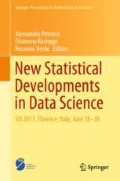Abstract
Composite indicators should ideally identify multidimensional concepts that cannot be captured by a single variable. In this paper, we suggest a method based on fuzzy set theory for the construction of fuzzy synthetic indexes of dyslexia, using the set of manifest variables measured by means of reading tests. A few criteria for assigning values to the membership function are discussed, as well as criteria for defining the weights of the variables. An application regarding the diagnosis of dyslexia in primary and middle school in Italy is presented. In this application, the fuzzy approach is compared with the crisp approach actually used in Italy for detecting dyslexic children in compulsory school.
Access this chapter
Tax calculation will be finalised at checkout
Purchases are for personal use only
References
Baliamoune-Lutz, M.: On the Measurement of Human Well-Being: Fuzzy Set Theory and Sen’s Capability Approach, UNU-WIDER, Helsinki (2004)
Baliamoune-Lutz, M., McGillivray, M.: Fuzzy well-being achievement in Pacific Asia. J. Asia Pac. Econ. 11, 168–177 (2006)
Cerioli, A., Zani, S.: A fuzzy approach to the measurement of poverty. In: Dagum, C., Zenga, M. (eds.) Income and Wealth Distribution, Inequality and Poverty, pp. 272–284. Springer, Berlin (1990)
Cheli, B., Lemmi, A.: A totally fuzzy and relative approach to the multidimensional analysis of poverty. Econ. Notes 24(1), 115–134 (1995)
Chiappero Martinetti, E.: A multidimensional assessment of well-being based on sen’s functioning approach. Rivista Internazionale di Scienze Sociali 108(2), 207–239 (2000)
Chien, C.-J., Tsai, H.-H.: Using fuzzy numbers to evaluate perceived service quality. Fuzzy Sets Syst. 116, 289–300 (2000)
Darestani, A.Y., Jahromi, A.E.: Measuring customer satisfaction using a fuzzy inference system. J. Appl. Sci. 9(3), 469–478 (2009)
Klir, G.J., Folger, T.A.: Fuzzy Sets, Uncertainity and Information. Prentice-Hall Int, London (1988)
Kwong, C.K., Bai, H.: A fuzzy AHP approach to the determination of importance weights of customer requirements in quality function deployment. J. Intell. Manuf. 13, 367–377 (2002)
Lazim, M.A., Osman, M.T.A.: A new Malaysian quality of life index based on fuzzy sets and hierarchical needs. Soc. Indic. Res. 94(3), 499–508 (2009)
Lorusso, M.L., Vernice, M., Dieterich, M., Brizzolara, D., Mariani, E., De Masi, S., D’Angelo, F., Lacorte, E., Mele, A.: The process and criteria for diagnosing specific learning disorderes: indications from the consensus conference promoted by the Italian national institute of health. Ann. Ist. Super. Sanita 50(1), 77–89 (2014)
Morlini, I., Stella, G., Scorza, M.: A new procedure to measure children reading speed and accuracy in Italian. Dyslexia 48(2), 176–195 (2014)
Morlini, I., Stella, G., Scorza, M.: Assessing decoding ability: the role of speed and accuracy and a new composite indicator to measure decoding skill in elementary grades. J. Learn. Disabil. 20, 54–73 (2015)
Morlini, I.: New fuzzy methods for psychometric data. In: Greselin, F., Mola, F., Zenga, F. (eds.) Cladag 2017 Book of Short Papers, Universitas Studiorum. Mantova, Italy (2017)
Sartori, G., Job, R., Tressoldi, P.E.: DDE-2 battery for the evaluation of dyslexia and disorthographya. Giunti, Florence (2007)
Smithson, M., Verkuilen, J.: Fuzzy Sets Theory: Applications in the Social Sciences. Sage Publications, London (2006)
World Health Organization: ICD-10: International Statistical Classification of Diseases and Related Health Problems 10th Revsion. World Health Organization, Geneve (2008)
Zadeh, L.A.: Fuzzy sets. Inf. Control 8, 338–353 (1965)
Zani, S., Berzieri, L.: Measuring customer satisfaction using ordinal variables: an application in a survey on a contact center. Stat. Appl. Italian J. Appl. Stat. 20(3–4), 331–351 (2008)
Zani, S., Milioli, M.A., Morlini, I.: Fuzzy methods and satisfaction indices. In: Kenett, R.S., Salini, S. (eds.) Modern Analysis of Customer Surveys, pp. 439–455. Wiley, Chichester (2012)
Zani, S., Milioli, M.A., Morlini, I.: Fuzzy composite indicators: an application for measuring customer satisfaction. In: Torelli, N., Pesarin, F., Bar-Hen, A. (eds.) Advances in Theoretical and Applied Statistics, pp. 241–251. Springer, Berlin (2013)
Zimmermann, H.J.: Fuzzy Sets Theory and its Applications, 2nd edn. Kluwer, Boston (1993)
Author information
Authors and Affiliations
Corresponding author
Editor information
Editors and Affiliations
Rights and permissions
Copyright information
© 2019 Springer Nature Switzerland AG
About this paper
Cite this paper
Morlini, I., Scorza, M. (2019). New Fuzzy Composite Indicators for Dyslexia. In: Petrucci, A., Racioppi, F., Verde, R. (eds) New Statistical Developments in Data Science. SIS 2017. Springer Proceedings in Mathematics & Statistics, vol 288. Springer, Cham. https://doi.org/10.1007/978-3-030-21158-5_24
Download citation
DOI: https://doi.org/10.1007/978-3-030-21158-5_24
Published:
Publisher Name: Springer, Cham
Print ISBN: 978-3-030-21157-8
Online ISBN: 978-3-030-21158-5
eBook Packages: Mathematics and StatisticsMathematics and Statistics (R0)

